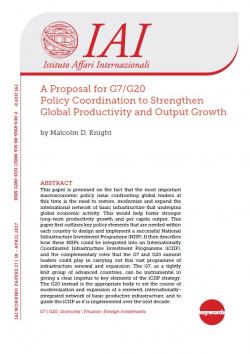A Proposal for G7/G20 Policy Coordination to Strengthen Global Productivity and Output Growth
This paper is premised on the fact that the most important macroeconomic policy issue confronting global leaders at this time is the need to restore, modernize and expand the international network of basic infrastructure that underpins global economic activity. This would help foster stronger long-term productivity growth and per capita output. This paper first outlines key policy elements that are needed within each country to design and implement a successful National Infrastructure Investment Programme (NIIP). It then describes how these NIIPs could be integrated into an Internationally Coordinated Infrastructure Investment Programme (iCIIP), and the complementary roles that the G7 and G20 summit leaders could play in carrying out this vast programme of infrastructure renewal and expansion. The G7, as a tightly knit group of advanced countries, can be instrumental in giving a clear impetus to key elements of the iCIIP strategy. The G20 instead is the appropriate body to set the course of modernization and expansion of a renewed, internationally-integrated network of basic productive infrastructure, and to guide the iCIIP as it is implemented over the next decade.
Paper presented at the international conference on “Major Challenges for Global Macroeconomic Stability. The Role of the G7”, organized in Rome on 27-28 March 2017 by the Istituto Affari Internazionali (IAI) with the support of the Italian Ministry of Foreign Affairs and International Cooperation and the Bank of Italy.
-
Details
Roma, IAI, April 2017, 9 p. -
Issue
17|18 -
ISBN/ISSN/DOI:
978-88-9368-046-2
Introduction
1. Addressing the obstacles to stronger global productivity growth
2. National Infrastructure Investment Programmes (NIIPs)
4. The roles of the G7 and the G20 in the design and implementation of the iCIIP
Conclusion



